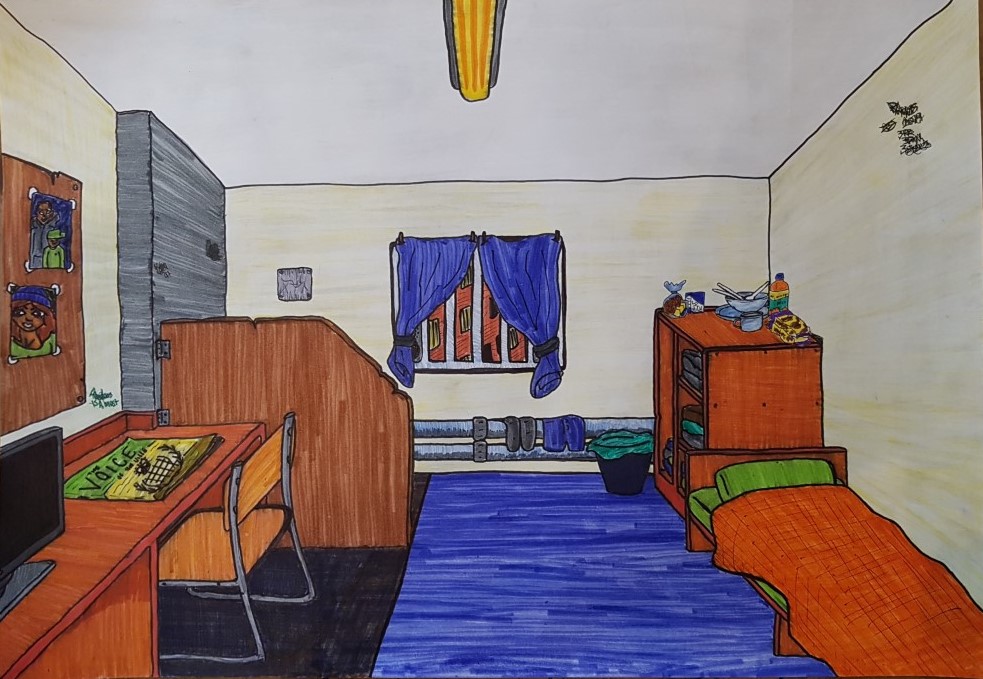
Last October I began a three-month placement with Prisoners’ Education Trust, with the objective of creating some short courses to improve learners’ study skills so that they can gain confidence and progress to longer qualifications.
In my everyday work I’m a sessional lecturer and PhD student in English and French literature at the University of Reading. I’ve done voluntary outreach work before, but this placement was my first insight into prison education.
Before writing the courses it seemed essential to meet some prisoner learners to get their thoughts on the project and witness what it’s like to study in prison.
Meeting prisoner learners in HMPs Cardiff and Prescoed
My placement was set up with PET’s Welsh Prison Project team, and I shadowed their visits to HMP Cardiff and HMP Prescoed, where they meet prisoner learners and collaborate with education department staff.
I sat in on one-on-one meetings, discussing my project with a series of prisoner learners, and then a full class of literacy students. The people we met ranged widely in age and background, but they were united by their desire to pursue education during their time inside. It was inspiring to see their commitment.
Offering a taste of distance learning
PET has supported thousands of prisoners, enrolling them on distance learning courses that they would be unable to access otherwise. But studying in a prison cell is challenging, especially for someone who’s had negative experiences of education or who hasn’t studied for some time.
When writing these courses I wanted to create materials that would refresh and improve learners’ study skills at Level 2 and above (that’s the equivalent to GCSE – grades 9-4 or grades A*-C). The courses give a taste of what distance learning is like and enable students to fulfil their potential when they progress to further courses.
Researching and writing the courses
Looking at PET’s recent data, I decided to base my two courses in the areas most popular with prisoner learners – Sport and Nutrition; and Construction, Trades, Health and Safety.
Courses in these areas help prisoners prepare for a range of jobs after their sentence ends: gym instructors, exercise specialists for older people, positions of technical skill and responsibility on construction sites, and many more.
These course areas are fairly removed from my expertise, so there was some research to do before I could start writing and I soon found myself sitting amongst the architecture students in the university library. I was able to bring together my knowledge of study skills with a wealth of material gathered from established courses, textbooks, exam papers, and specialist books in these areas.
A sense of progress during lockdown
After a couple of months’ work, I had the two 60-page short course textbooks ready to go. Our original plan was to pilot them in two prisons, so that any small tweaks could be made before they were published on PET’s website in late spring.
Then Coronavirus struck. Prisons are particularly vulnerable to the virus, staffing levels have been reduced because of sickness, and prisons have instigated a 23-hour-a-day lockdown to minimise infection risk. Needless to say, this is a very tough situation for prisoners, with long confinement combined with fears of the virus and concern for family and friends outside.
As part of its response to this unprecedented situation, PET piloted the courses in a handful of prisons and then quickly rolled them out across the rest of the estate.
Each course is designed to take around five hours: if it can provide a short burst of mental stimulation and a sense of progress beyond the Coronavirus news cycle, then the project will have been well worth it.
Many thanks to PET for shaping a role for me within the vital work they do in the prison education sector.
I’m grateful to the funding body behind my doctoral training programme, the Arts and Humanities Research Council (administered by the South West and Wales Doctoral Training Partnership). Their excellent placement scheme has enabled me to expand my academic work beyond the four walls of the university.